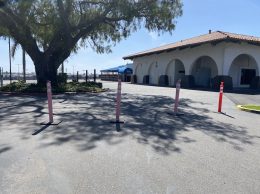California is not a business-friendly state.
So after nearly 22 years in Ventura, Fashion Forms, the company that developed the push-up water bra, is leaving for Austin, Texas.
About five California companies per week were making similar moves just a few years ago, fleeing to better business climates. And while that tide has stemmed some, due to an improved overall economy, California’s reputation as arguably the most difficult state to do business in remains.
Fashion Forms is just the latest example of an increasing number of small businesses in California finding greener pastures in other states.
Union Bank’s latest annual Small Business Economic Survey found that 20 percent of small businesses in California are considering leaving the state.
“The past 22 years in California have been a wonderful and fulfilling journey for me and Fashion Forms. Our products are constantly evolving and as a company we are expanding to meet the needs of our customers,” said Ann Deal, Fashion Forms founder and CEO. “Austin has welcomed us with some amazing growth opportunities and we look forward to becoming a part of this thriving business community.”
Neither the state nor the city of Austin is offering the company any incentives in its move. But it’s not hard to understand why Fashion Forms is closing up shop in California and moving almost 1,500 miles to start anew.
For all intents and purposes, Texas is a tax haven not unlike a Swiss bank account. The state has no corporate tax and no income tax. The state makes up for it with typically higher sales tax and property taxes, but on June 15 Texas Gov. Greg Abbott signed into law tax cuts for homeowners and businesses worth $3.8 billion over the next two years.
Fashions Forms is not just moving, it’s also expanding. The bra designer recently signed a lease for a 90,000-square-foot space that will house its growing office and distribution center. Fashion Forms also plans to add an additional 40 staff members. Calls to the company weren’t returned for this report.
Deal started the company in 1993 from her garage in Calabasas. She made waves in the intimate apparel industry early on with a backless-strapless bra, later inventing the water bra, which model Heidi Klum backed. The company holds 14 patents and 18 trademarks for its products and is sold in more than 9,500 stores worldwide.
In the struggle to keep companies like Fashion Forms, cities and states are usually at odds, with the finger-pointing going both ways when companies decide to leave.
When auto manufacturer Toyota, a company that had spent almost 60 years in Torrance, moved thousands of workers to a new headquarters in Plano, Texas in the spring of last year, the state blamed the city. Torrance blamed the state and put Gov. Jerry Brown in the hot seat.
After Toyota left, Brown admitted there was plenty to work on when it comes to the failures of the state’s business climate.
A study of business tax climates by the Tax Foundation, a conservative-leaning research group, found that California’s businesses face the third-highest state and local business tax in the country.
On the flip side, the Tax Foundation ranks Texas No.10 among the friendliest states for business tax.
Additionally, Governing Magazine, a state and local government news outlet covering policy and management, surveyed entrepreneurs and business owners and gives Texas an “A+” grade for its business climate. California, whose businesses climate is characterized by red tape, regulation and high tax rates, received an F. California annually ranks last in Chief Executive magazine’s ranking of “Best States/Worst States.”
Rating California No. 49 on a list of “free states,” the Mercatus Center at George Mason University, which studies the intersection of markets and personal freedom, says that California “taxes and regulates its economy more than most other states” and ranks the state last in regulatory freedom and No. 49 in occupational licensing regulations.
This year, for the fourth straight year, California will see a net outflow of residents — about 3.5 million people — moving to lower-tax states.






 Print
Print Email
Email

















